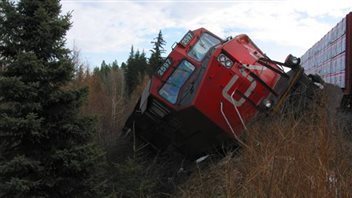Falling asleep while at the controls of any machine is dangerous. Imagine now that you’re the driver of a locomotive hauling a freight train of hundreds of thousands of tons of hazardous material.
Operators have told a special investigation by Canada’s national public broadcaster, CBC, that they are chronically exhausted when called in to work.
Several current and former engineers spoke to CBC following the Lac Megantic rail disaster of July 6, 2013. In that instance, the lone engineer is accused of criminal negligence causing death when the unmanned freight train of petroleum tankers, parked for the night, rolled down a grade into the town where it crashed and exploded, killing 47 people and destroying several buildings in the centre of the small village.

The engineers say they have long shifts when called and are expected to be on call 24/7, so they have constantly irregular sleep schedules and never know when or how long to sleep.
One engineer told the CBC that on several occasions he has drifted off to sleep for a few moments and then snapped back disoriented for a few seconds. He said in one case while at the controls of a 3-kilometre long train, he missed a warning signal, and woke up just in time to see a stop signal. He said if he hadn’t managed to stop the train in time, there could have been a serious accident or death.
Canada’s Transportation Safety Board guidelines recommended a railway running a one-person operation review its existing “fatigue management plan” to ensure it included advance notification of work schedules, the opportunity to nap as required and proper shift rotations, breaks and work/rest cycles.
A railway workers union, Teamsters Canada Rail Conference (TCRC) conducted its own survey of fatigue. There were 1,909 respondents, 1,790 of whom were freight train operators. Three-quarters of those surveyed reported falling asleep while working at least once in the month prior to the survey. Ninety-six per cent say they have gone to work tired, with 62 per cent reporting it happens “frequently” or “always.”
Additionally worrisome is that that almost half the engineers (43%) who booked off due to fatigue said they faced investigation and/or discipline.
Critics of railway practices point out that truck drivers who are fatigued can pull off the road for a while, but train engineers can’t “pull over”. They also point out that airline pilots know their shifts a month in advance whereas railways plan assignments hour by hour.
Transportation fatigue expert Clinton Marquardt, who for the past 11 years has worked for or alongside the Transportation Safety Board (TSB) on 91 accident investigations, told CBC News the issue is too large to be ignored.
“My biggest fear,” Marquardt said, “is that we have a catastrophe like Lac Megantic that will be attributable to fatigue.”
In response, both Canadian National Railway (CN), and Canadian Pacific Railway (CP) say they have mandatory fatigue management programmes in place.
In an accident report of a crash in 2009 of two freight trains in Saskatchewan, (with fortunately no injuries) the Transportation Safety Board investigation looked deeply into engineer fatigue. Although the rules were followed, it showed the engineer had worked 28 periods in 30 days and on several different shifts resulting in disruptive sleep patterns.
Marquart conducted a “bio-mathematical” analysis of the operator’s sleep over the previous 30 days and concluded on six different shifts he would have been so sleep-deprived, it was as though he’d been drunk.







For reasons beyond our control, and for an undetermined period of time, our comment section is now closed. However, our social networks remain open to your contributions.